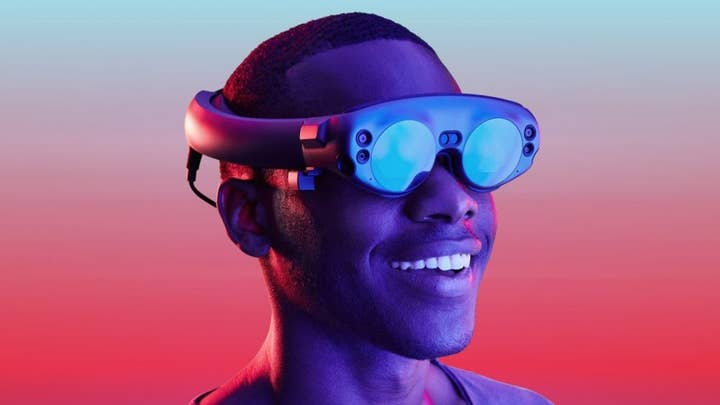A (Magic) leap backwards | Opinion
The woes experienced by the over-hyped AR firm were easily predictable -- but the backlash will cause headaches for the sector at large
Let me preface this article by acknowledging that since The Information reported on layoffs at Magic Leap following miserable sales of their AR headset, Magic Leap has roundly denounced the article both in public and in private. Let me then postface that preface by pointing out that Magic Leap's denunciation took the form of a huffy statement that did not dispute any specific factual points in The Information's reporting -- a particular form of PR gobbledygook that anyone who's been in this industry for longer than a hot second recognises as code for "you're not actually wrong, but we really don't like that you're saying it in public."
The report, damning as it is, didn't actually make particularly huge waves in the industry, largely because the scenario it depicts is pretty much exactly what anyone well-informed expected (which makes the company's fit of high pique in response look all the more ridiculous). After almost a decade of promises both cryptic and overblown, Magic Leap's headsets finally became available on the market about 15 months ago -- and landed with something of a wet thud. Underwhelming and grotesquely expensive (with a 'developer preview' tag attached like a fig leaf for the latter problem), the limp launch could have been forgotten if it had been followed up with an aggressive cycle of development and improvement. Instead, it looks like the earliest we'll see actual new hardware from the company is 2021.
"Magic Leap's failure to deliver on its promises and the problems it has faced have a potential impact far beyond the company itself"
It's easy to pick on a company like Magic Leap when it falls flat in this way, because it's a textbook example of the kind of Silicon Valley hubris that so infuriates everyone outside the reality-distortion field of the US tech startup bubble. This is a company that spent years sucking up billions of dollars of venture capital, making outlandish claims about their technology and engaging in that bizarre version of "secrecy" that only tech start-ups seem to get away with, wherein you repeatedly put your company on every magazine cover in sight but also refuse to actually answer basic questions about what you're doing.
The billions (somewhere around $2.6 billion raised, which is currently being supplemented by yet another round of funding) and the magazine covers become a self-reinforcing cycle; the coverage begets funding which begets coverage, and the fact that the product at the middle of this swirling cyclone of money and attention remains so ill-defined and cryptic seems to be lost along the way. Then, one day, you actually have to launch something that people can buy and... well, it turns out to be a pretty standard, distinctly non-revolutionary kind of AR headset and some software to drive mixed reality. Not a million miles from what competitors are doing with far less fanfare, and vastly less exciting than would be required from a company some investors and writers saw as being the next Apple.

So yeah -- when that company, after all its posturing and all the cash it raised, turns out to have failed to shift more than a few thousand of its over-hyped Halloween costume goggles, it's definitely easy to poke fun. But the fact is that Magic Leap's failure to deliver on its promises and the problems it has faced as a result -- which are likely only just getting started, because this latest funding round is presumably going to come at a valuation which would see investors in previous rounds taking a pretty severe haircut -- have a potential impact far beyond the company itself.
In many ways, this kind of high-profile over-promising and under-delivering mess is exactly what AR didn't need at this point in time. We're a couple of years off functional consumer-ready products -- perhaps more than a couple, depending on what further roadbumps are encountered along the way -- and most of the big players, no doubt mindful of the tough time VR got from consumers, are being pretty careful about managing expectations while that tech spends the necessary time under development.
"The people who really deserve a sympathetic thought are Magic Leap's staff -- at least some of whom are already facing unemployment"
Hololens is a prime example of this, as is Google Glass' second life as an industry-focused platform. But even firms like Apple, which is working in private on hardware and doesn't have anything out in the wild aside from its ARKit software platform, are clearly being pretty careful not to let this get over-hyped too badly. Every bit of blue-sky, forward-looking speculation about an AR-driven future for personal computing from these companies is carefully couched in caveats, and gently brought down to earth with a dose of reality about current limitations of the tech.
Magic Leap didn't see itself as being bound by any of that "carefully setting expectations to realistic levels" nonsense and, well, I guess everyone working on AR elsewhere must have their heads in their hands at this point. The outcome was so inevitable; for all that Magic Leap did an excellent job of selling the concept of AR with its various visualisations and demos -- the company's creativity in this regard deserves a doff of the cap regardless of anything else, and it famously worked with Weta on some of its better-known concepts -- the time was obviously going to come when the piper would have to be paid. The risk now is that Magic Leap's promises were so far-fetched and so overblown, not to mention so widely reported, that its failure to launch makes AR -- which should and by all rights will be the next major revolution in personal computing -- look like an over-hyped bubble when it's really still only in its infancy.

Investors are going to get burned, no doubt, though the way venture capital works means that there'll be some good money out there to get thrown after the bad, and given enough time and a radical shift in direction Magic Leap could even turn itself into a firm that returns something on all those billions it received. It will be a tough road, though; Magic Leap's billions in VC sunk costs and the fact that it doesn't really have much of a tech advantage over its competitors makes it into an unappealing buyout target, for one thing. The silver lining, I suppose, is that the price tag for the goggles is too high for very many consumers to get burned as well. The sheer level of hype Magic Leap attracted, however, means that the mess that it's turning into has implications for the strategy required of any company hoping to launch a product in this sector.
It remains likely, of course, that a big enough entry from a major player -- Apple announcing its plans, Google reviving its consumer AR ambitions, or Facebook making the jump into this market from its current foothold in VR -- can overcome any real negativity created by Magic Leap's under-delivering, but the process is definitely being made harder -- "It works this time, we promise" is simply a harder pitch to sell than "look at this cool new thing."
That's a problem VR is still dealing with, and now it seems that AR is going to have to overcome that issue as well. It isn't the only bump on the road -- the chilly consumer reception to Google Glass, which most people seemed to find straight-up creepy, indicates another area where there's going to be a lot of friction to overcome -- but having a widespread perception that you're peddling snake oil is still a tougher starting point than anyone would want for their AR offerings.
It's worth bearing in mind nonetheless that the people who really deserve a sympathetic thought in this situation are the majority of Magic Leap's staff -- at least some of whom are already facing unemployment, if The Information's, er, information is correct. From the outset Magic Leap has had its fair share of smart, creative people working there, and while their ideas might have been leveraged in ways that seem designed to build hype and suck in funding rather than actually creating a great product, that doesn't change the fact that the work done by many of the teams there was excellent.
The problem lies not with the concepts Magic Leap promoted, but with the implicit promise that those concepts were representative of a product the company would ship -- a promise which hasn't been kept, and whose high-profile failure could come back to bite not just the company itself, but the whole burgeoning industry it's operating in.









